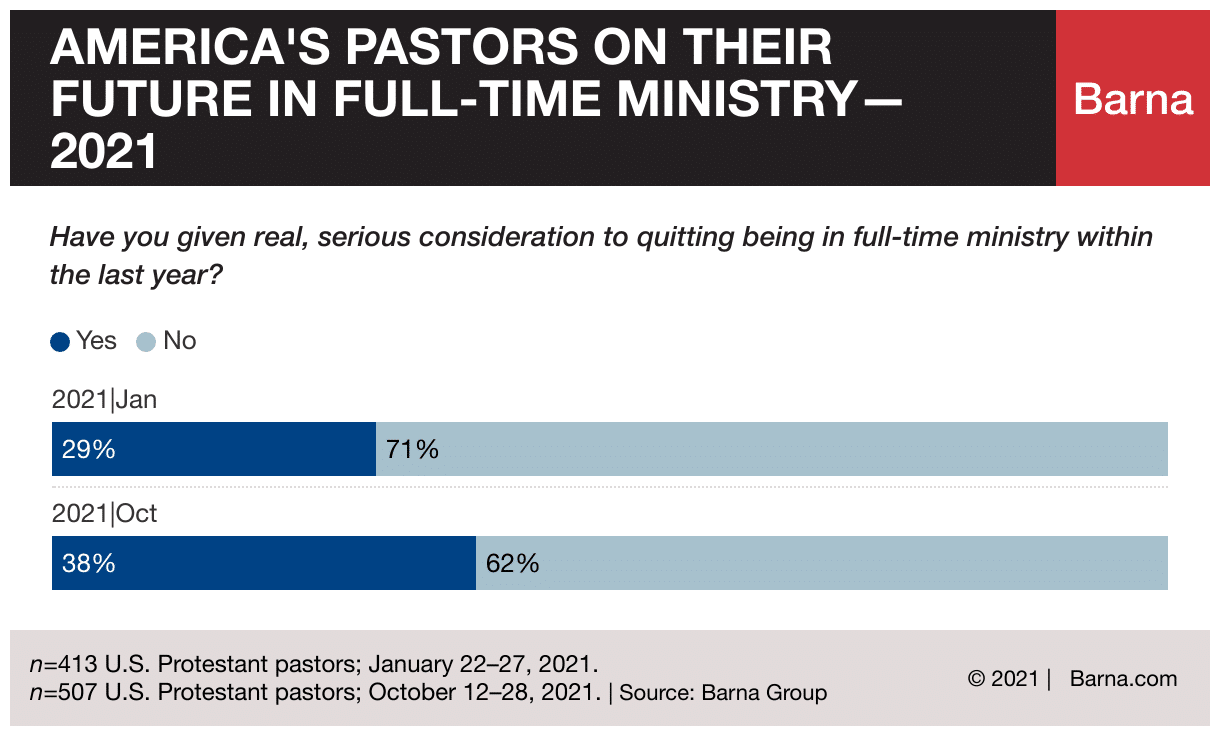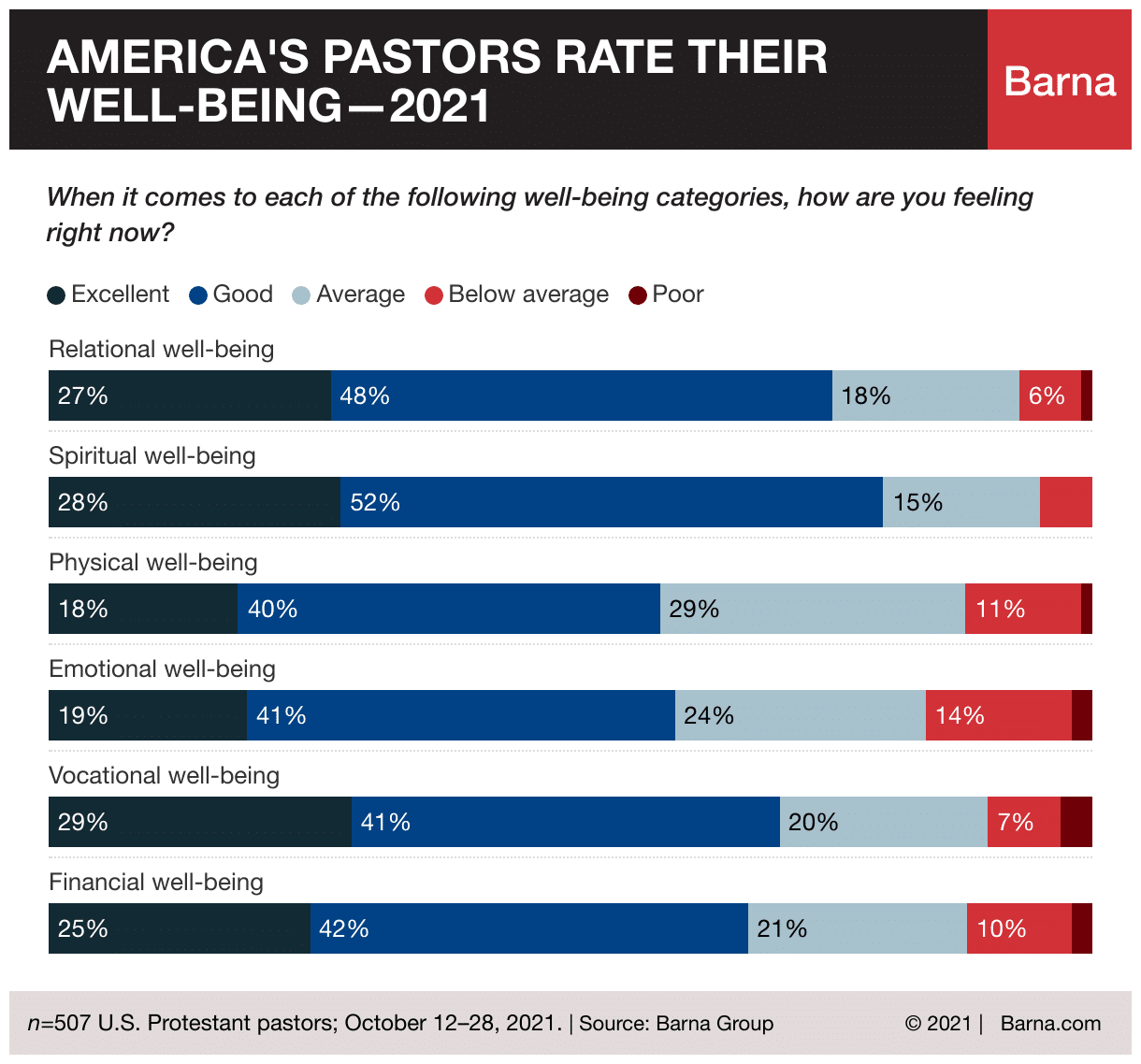Estimated reading time: 7 minutes
Churches are unique places to work because the “shop is open” at times when most people are resting from their workweek.
Weekend services, mid-week church meetings, small groups, and special events all take their toll on church employees and can lead to ministry burnout.
And let’s be real, working every weekend can be difficult.
An alarming statistic shares that 38% of U.S. pastors have thought about quitting full-time ministry in the past year!

As pastors share their thoughts on throwing in the towel they also share how well they are doing. Only 28% describe their spiritual well-being as being excellent. So what about the rest of the pastors?

The Pandemic Has Taken Its Toll
I’m not sure that would surprise anyone. The never-ending pandemic has taken its toll on even the most resilient church leaders.
But the fact remains that pastors and church staff are experiencing job burnout.
This dynamic creates a unique challenge for church leadership to ensure that employees fulfill their job duties but also that they don’t get burned out in the process.
According to the Families and Work Institute (FWI), American workers feel overworked, and employers that provide effective workplaces help minimize this effect.
A study done by the Families and Work Institute suggests that employers should create work environments that support employees and help them manage the many conflicting issues and pressures in their lives.
An effective workplace is one that:
- Provides employees the opportunity to continue to learn.
- Has a culture of trust.
- Gives employees the flexibility needed to manage work, personal, and family life.
- Provides employees with the feeling of being supported by their supervisor to succeed at work.
- There is autonomy and independent thinking.
- Employees are satisfied with pay, benefits, and opportunities for advancement.
It is also recommended that employers look at the employee as a whole and recognize them for what they do outside the workplace.
It has been found that employees who have a good work-life balance are actually more successful at work.
Things are changing rapidly, and with increased pressure to get things done quicker, churches need to think about the employees’ ability to respond to the fast pace and rethink how work gets accomplished.
Church employees need periods of “recovery” to refocus, regroup, and recharge after completing large projects and before planning the next big church event.
Employees who do not have the opportunity to get recharged can become overwhelmed and can exhibit feelings of being overworked.
Work groups should focus on achieving church goals and objectives and should constantly be looking for more efficient ways of getting work done.
7 Things Churches Can Do to Help Church Staff Avoid Burnout
1. Provide Uninterrupted Work Time
Church leadership should set aside periods of time during the day when employees can focus on tasks without interruption.
This uninterrupted work time helps employees focus on accomplishing work responsibilities.
For example, limit the times of the day when group meetings take place to allow for individual desk work time.
A great book that can help you help your team find out the right time of day to have a meeting is a book by Carey Nieuwhof called At Your Best: How to Get Time, Energy, and Priorities Working in Your Favor. This book would make a great staff read.
2. Establish Realistic Deadlines
It is important to hold employees accountable for job responsibilities without pressuring them unnecessarily.
For example, a strategy I have used is to allow the employee to help set their own work deadlines.

I merely ask them what a reasonable time frame would be for completing a task and then hold them accountable for that time.
For instance, I might say: “Kim, I’m going to need the board report before our next meeting. When is a realistic timeframe for you to complete it so I have a few days to review and make changes?
This takes away their argument of unrealistic expectations and timelines.
3. Eliminate Low-Value Work
Church growth and development is a process.
Sometimes, the process requires employees to perform certain job tasks. However, after a period of time, those job tasks no longer add value.
Church leadership should constantly look at what employees do and help to eliminate unnecessary tasks.
Evaluate employee job descriptions once a year to ensure that employees are only spending time on those things that add value and contribute to fulfilling the church mission.
4. Set Accessibility Parameters
Time away from the office should be a time to refresh and prepare for the next workday.
We all know there are times after work hours when emergencies happen and employees need to be contacted.
Set very specific guidelines for contacting employees after work hours. This necessary step will help you help employees minimize excessive contact that conflicts with rest away from work.
5. Discourage Working Vacations
Vacations are an extended period of time away from the office that is intended to provide rest for employees.
Technology has changed how we all take vacations since the introduction of smartphones.
We all look forward to those vacations. Unfortunately, we occasionally experience times when work issues interrupt a much-needed break.
Set boundaries for being interrupted on vacation. Set the example from the top of the organization.
For example, require employees to turn their phones off and not check email while on paid time off.
The whole purpose of time away from work is to refresh and recharge, so contacting employees while they are on vacation should only happen in the event of a true emergency.
6. Provide Pastor Sabbaticals
A pastor’s job can be difficult. These faithful church leaders carry the burdens of church members, volunteers, and employees.
Many of the issues pastors deal with are confidential in nature, making it difficult to process without a strong spiritual foundation. This necessary foundation can be strained by the day-to-day responsibilities of pastors.
Pastor sabbaticals are one way to help pastors refresh and refocus on their calling.
Establish a sabbatical program for pastoral staff to allow them to take a much-needed break from church responsibilities.
A sabbatical can be established for a few weeks to several months. Regardless, create a policy and process to help your pastoral staff take a much-needed break.
You might be surprised by the new focus and energy a pastor has after returning from a needed break.
7. Prayer For Staff
Pastors take the brunt of carrying the church. However, church employees carry their share.
Employees have responsibilities that often rely on volunteer support. This adds a dynamic that is different from that of other organizations.
Pastors and staff all need constant prayer.
Designate times of prayer focused on staff. Solicit help from members and for them to commit to praying for the staff, church leaders, and pastors.
As we work through this challenging time for churches, we need to all do our part in supporting those who are called to ministry.
Let us not become weary in doing good, for at the
proper time we will reap a harvest if we do not give up.
Galatians 6:9
If you think this is not important, think about a world that is void of life-giving churches!
We need our pastors and church staff!
Employees Are Our Most Valuable Asset
As employers, we understand the importance and value of our employees.
Creating a balanced work environment for them is a win-win because a rested, focused, and balanced workforce, not only helps the employee but ultimately helps the church fulfill its mission.
What does your church do to help employees avoid burnout?
Learn more tips for managing church staff by earning a certificate in Church Administration!



